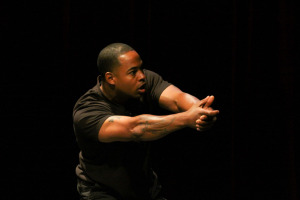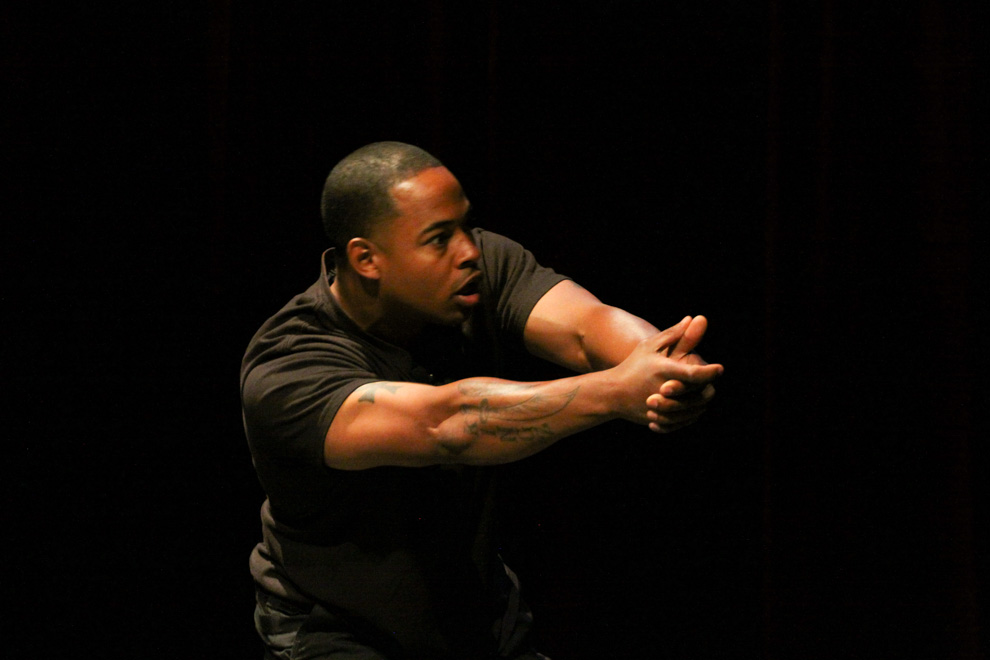
A lone man stands on an empty stage. The lights come up as he begins to tell his story. It’s personal, it’s political, and it’s multifaceted — seventeen different perspectives, to be exact. Jinho “The Piper” Ferreira examines law enforcement, sexual violence and gun violence, the Black community and the media in his one-man play “Cops and Robbers.” I had the opportunity to talk with Piper about his play and see it Friday night in Cubberley Auditorium.
“I wanted to hold a mirror up to everyone to show everyone what I was seeing because you know, my cop friends, they didn’t know what was going on in the elementary schools in Oakland; they don’t have children there,” Piper explains to me, giving just one example of the many perspectives he tries to portray in “Cops and Robbers.” He was so fed up with seeing all these different perspectives, switching from one community to the next on a daily basis, while knowing that others couldn’t see what he did. So he took his four days off and spent the entire time writing. That’s how the play was born.
It isn’t an easy play to watch. “Cops and Robbers” follows a complicated story in which a policeman kills his former friend from the hood for pimping out his 13-year-old niece, leading to her death, under the false pretense of self-defense. We might be able to see some justification for this action, even if it’s unforgivable. Certainly some characters in the play do, whereas others – like the racist radio talk-show host – find fault in every other character.
These themes of police brutality and racial tensions are not new, but seeing them in this context is. Instead of just a discussion, protest or news report, we get all three — in addition to quiet monologues disclosing the darkest truths a person would never speak aloud if he knew everyone was listening.
Piper shifts very effectively from one character to the next, creating a distinctive voice, physicality, and motivation for all seventeen characters. As is typical of one-man plays, the features of each character are somewhat exaggerated to really establish each one as a separate individual. This generally works well and adds to the comedic moments of a play that tackles heavy issues.
However, at some moments, the comedy seems out of place. The only real female character in the show, a reporter who spends half her stage time adjusting her clothes, is hilarious at first, but eventually the bit grows old as the story becomes more complicated and all the other characters grow with it. By the end, she’s still pushing her cleavage together as the truth of the murder comes out; it’s disconcerting to see a piece that pushes boundaries in other areas reverting to these age-old female stereotypes.
But as Piper puts it, unapologetically, this is his perspective. It isn’t perfect; it’s human. The play is messy and “is going to be frustrating to everyone that watches it,” Piper explained to me, but “it is intentionally written that way.” He won’t shy away from the explicit conversations between inmates, which probably warranted a stronger trigger warning, because he’s telling it as he sees it.
Piper was frustrated with the status quo he saw: “It’s almost as if America has preferred to have a riot and a huge racial disagreement every year or two instead of creating structural change.” “Cops and Robbers” is his call to action, his way to open people’s eyes. It’s the discomfort we feel while watching that he hopes will push us to fight for change. So go see it, make up your own mind about it, and then add your voice to the seventeen he’s already put on stage.
See “Cops and Robbers” at the Marsh in Berkeley.
Contact Noemi Berkowitz at noemi11 ‘at’ stanford.edu.
